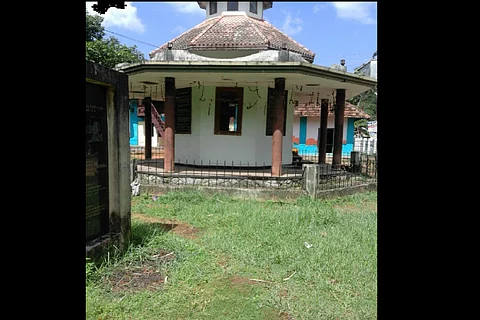

Simmering discontent over prolonged closure of the Ayyankali Smriti Mandapam -the final resting place of social reformer and Dalit icon Mahatma Ayyankali- at Venganoor in Thiruvananthapuram threatens to spill over yet again, with political rallies to be held in Kerala from August 16 onwards.
The shrine -situated on 60 cents of land as per data from the latest resurvey- is currently embroiled in a legal dispute over ownership. Two Dalit organisations, the Kerala Pulayar Maha Sabha (KPMS) and the Sadhu Jana Paripalana Sangham (SJPS) have asserted their claims in this regard.
The shrine had been sealed off by the district administration, citing law and order issues in 2009, after a face-off between the groups turned violent.
“We plan to spread our message on the importance of reopening the shrine from Mundakkayam through Ernakulam and onwards to Venganoor on August 28. It will be conducted under the banner of the Janmadina Sandesha Yatra,” says Venganoor Rajendran, the State President of the Saadhu Jana Paripalana Sangham (SJPS), an organization formed by Ayyankali himself.
“It is true that the land is locked in a legal dispute at the Neyyatinkara court. The court has however not issued any directive to seal off the shrine. It was a decision taken by the district administration, after law and order issues arose,” he adds.
The shrine is now opened only on the dates of the poet’s birth and death anniversaries. On other days, the shrine can be accessed with a request forwarded to the District Magistrate, 15 days prior to the date of visit.

Cause of fracas
“The entire plot is gradually being swamped by weeds. There have also been encroachments onto the land by private parties from surrounding areas. Several individuals have actually laid private pipelines through this land without legal permission of any sort. The shrine originally stood on 84 cents of land, which as per the latest resurvey, has come down to 60 cents. Electric supply to the shrine has been disconnected. The literal darkness serves as a cruel irony for those of our community who were guided into the light by the sustained efforts of Mahatma Ayyankali alone. What is happening now is in complete opposition to his teachings,” reiterates Venganoor Rajendran, while speaking to The News Minute.
KPMS leaders however have a different story to tell. “The dispute over the land is between the Venganoor branch of KPMS and the SJPS. We have -on numerous occasions- tried to settle the disputes with all-party meets, but in vain. The SJPS is adamant on the issue of ownership,” says KPMS State Treasurer Thuravoor Suresh.
"We were the ones who pushed for the shrine to be opened whenever anyone wanted to pay respects, irrespective of political affiliation. The shrine is well-maintained and we would never allow any harm to befall it," says KPMS leader TV Babu.
The incumbent LDF government -in its maiden budget- had set apart Rs 40 crores for each of the proposed Kerala Renaissance cultural complexes that are to come up all across the state.
A complex named after Ayyankali is proposed to be set up in the capital city. Such a move would however serve no purpose in breaking the stalemate at Venganoor, where Ayyankali and his conquests still remain a perennial presence more than half a century after his death.
Venganoor houses the very first school for Dalits set up by Ayyankali, which was razed to the ground by upper caste Hindus on more than one occasion.Born into the Pulaya caste (considered untouchables at that time) in 1863, Ayyankali had tirelessly worked for the upliftment of the Dalits all through his life, bearing the battle scars of countless bloody confrontations with the upper-caste Hindus.
In 1893, he rode through the streets of Venganoor on two white bullocks, with a bell around its neck, in what later came to be described in the annals of regional history as the ‘Villuvandi Yatra’.
In those days, the untouchables were neither allowed to use the public streets nor ride atop a cart. The Villuvandi Yatra and similar protests through Punnamoode and Vedivechankovil -where artisans involved in crafting clothes, toiletries and gold ornaments for the royal family were lodged- naturally drew the ire of casteist Hindus.
Ayyankali’s stroke of genius in cutting a deal with the fishermen of Vizhinjam to ensure that the striking workers did not starve to death made it to the state’s renaissance history.
A few historians even credit him with having introduced the concept of Satyagraha when he protested against the arrest of one of his close aides in front of the Balaramapuram police station in the state capital.
In the streets of Venganoor, the name Ayyankali is such a ubiquitous presence that the state government’s decision to celebrate his birth anniversary on August 28, his actual date of birth as opposed to traditional celebrations on the date according to the Malayalam calendar (Avittam of Chingam) is still met with derision.
As a senior Dalit leader chose to put it: “The date as per the Malayalam calendar falls in the month of September…and that is when we celebrate our Onam.”